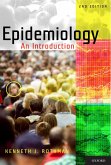In the past thirty years epidemiology has matured from a fledgling scientific field into a vibrant discipline that brings together the biological and social sciences, and in doing so draws upon disciplines ranging from statistics and survey sampling to the philosophy of science. These areas of knowledge have converged into a modern theory of epidemiology that has been slow to penetrate into textbooks, particularly at the introductory level.
Epidemiology: An Introduction closes the gap. It begins with a brief, lucid discussion of causal thinking and causal inference and then takes the reader through the elements of epidemiology, focusing on the measures of disease occurrence and causal effects. With these building blocks in place, the reader learns how to design, analyze and interpret problems that epidemiologists face, including confounding, the role of chance, and the exploration of interactions. All these topics are layered on the foundation of basic principles presented in simple language, with numerous examples and questions for further thought.
Dieser Download kann aus rechtlichen Gründen nur mit Rechnungsadresse in A, B, BG, CY, CZ, D, DK, EW, E, FIN, F, GR, HR, H, IRL, I, LT, L, LR, M, NL, PL, P, R, S, SLO, SK ausgeliefert werden.









